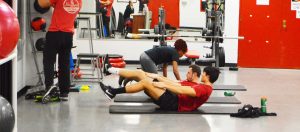With every New Year comes the trend of new resolutions. While everyone has different resolutions, some common resolutions include improving health overall, gaining or losing weight and quitting bad habits. According to the American Psychological Association, 75 percent of all New Year’s resolutions are heath and fitness based.
Chair of Kinesiology and Sports Sciences Lisa Hicks said she thinks it is due to the way people live their lives in todays fast paced world. According to Hicks, new years resolutions are commonly health and fitness based due to the unhealthy habits that people develop.
“[With] people in our society today, it’s so easy to live an unhealthy life. We have too many processed foods that are quickly and readily available, high caloric, not very nutrient dense and foods that are available to us for a cheap price. We tend to eat those things because we live a pretty quick and fast paced lifestyle, we have a lot jam packed into one day.”
Because people live busy lives, trying to fit a healthy diet and exercise into their schedule is difficult according to Hicks, but a lot of people are not deterred.

There are numerous benefits to finding and living a healthier lifestyle, such as the reducing chances of diseases, feeling emotionally and physically better and having more energy, according to Healthline.com. Hicks said she thinks the majority of people’s purpose behind their new years resolutions is appearance based.
“They want to look better in their outfits, for someone else, for themselves, whoever they want to,” Hicks said. “So, I’m going to say it starts there.”
These goals are not met the majority of the time. On average, only eight percent of all New Year’s Resolutions are successful according to the American Psychological Association. The other 92 percent fail for a number of different reasons, but Hicks said one reason resolutions fail is because of the unrealistic goals that are set.
“The first piece of advice I’d give someone that wants to do this is to set realistic goals,” Hicks said. “So whatever state you’re in, it took you a long time to build that habit and that lifestyle, and it’s going to take you some time to create this alternate lifestyle.”
Junior nursing major Colin Hassinger said he is working towards getting back in shape. He said his nursing background helps him understand the benefits of getting healthier and that is one of his motivators.
“One of my new year’s resolutions is to work out more,” Hassinger said. “I worked out a lot in high school because I played sports and then I just let myself be lax, so I want to get back to physical shape.”
Hicks said that having a good network of people that will keep students accountable and motivated will help with any consistency problems that might occur. Hassinger uses this technique by working out with his fellow RA’s.
“All the RA’s in Cory Bretz have been working out a lot more,” Hassinger said. “So I’ve been working out with Axel [Sved], Jon Haller, and all the other RA’s in Cory Bretz.”
A problem a lot of these students have is that, according to Hicks, they are unable to find the motivation to continue to work on their goals. With junior visual communication design major Albrecht Ryll, that isn’t a problem. Ryll is using his resolutions as a way to work towards his goal of being a powerlifter. Ryll said his new years resolution is to create a better workout schedule, develop better eating habits to retain a better metabolism and to drink more water.
“What inspired me mostly was that I started looking at workout videos and I started seeing how what I was eating was really affecting my diet, too much pop, greasy foods, fried foods, all that stuff wasn’t really contributing to where I want to be with my workouts,” Ryll said. “I want to be a powerlifter and in order to get those kind of gains, when it comes to lifting heavier weight, it really matters what you put into your body makes the total difference.”
There are many strategies students can implement in order to be in the eight percent of success stories when it comes their resolutions. Hicks said there are some options students can take if they are struggling staying consistent with resolutions and goals, some of those consist of: finding an accountability partner, setting realistic goals, and being patient.








